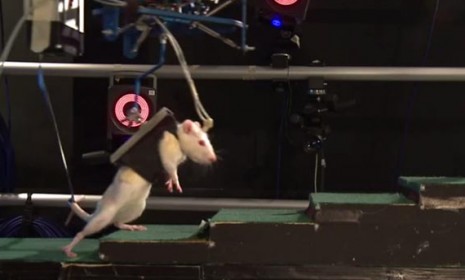The robotic therapy that made paralyzed rats walk again
Swiss scientists develop a groundbreaking new rehab therapy that teaches the body to rewire its nerves despite crippling injuries

A free daily email with the biggest news stories of the day – and the best features from TheWeek.com
You are now subscribed
Your newsletter sign-up was successful
The video: With chemical injections, electrical stimulation, and a tiny robotic harness, paralyzed rats with severe spinal cord injuries were able to learn to walk again using their own strength. The new study, published in the journal Science, demonstrates how applying these three different treatments simultaneously could rewire nerves. Researchers from the Swiss Federal Institute of Technology injected the rats' severed spinal column with a "cocktail" of chemicals like dopamine, adrenaline, and serotonin, replacing the body's natural neurotransmitters with new ones (which the brain would normally send down a healthy spine). Tiny electrodes then stimulated these neurons to coax the spinal cord back to life. Finally, the rats were fastened into a robotic harness, tempted by a piece of chocolate, and trained to use their paralyzed hind legs again for 30 minutes a day. Within a few weeks, the rats began forging new nerve connections and were able to walk — and in some cases, sprint — as if they were never paralyzed.
The reaction: "This is the world-cup of neurorehabilitation," study author Grégoire Courtine tells Popular Science. Just weeks ago these rats were completely crippled and unable to move their limbs. Now? They're essentially athletes. Still, it's "premature to say that this can be directly applied to people," Peter Gorman, chief of rehabilitation medicine at the Kernan Orthopedics and Rehabilitation Hospital (who wasn't involved in the study), tells ABC News. Spinal cord injuries in people are typically much more complicated than the neat incisions researchers made to sever the rats' spines. But we're "certainly getting closer" to a full-fledged cure.
Take a look:
The Week
Escape your echo chamber. Get the facts behind the news, plus analysis from multiple perspectives.

Sign up for The Week's Free Newsletters
From our morning news briefing to a weekly Good News Newsletter, get the best of The Week delivered directly to your inbox.
From our morning news briefing to a weekly Good News Newsletter, get the best of The Week delivered directly to your inbox.
A free daily email with the biggest news stories of the day – and the best features from TheWeek.com
-
 Health insurance: Premiums soar as ACA subsidies end
Health insurance: Premiums soar as ACA subsidies endFeature 1.4 million people have dropped coverage
-
 Anthropic: AI triggers the ‘SaaSpocalypse’
Anthropic: AI triggers the ‘SaaSpocalypse’Feature A grim reaper for software services?
-
 NIH director Bhattacharya tapped as acting CDC head
NIH director Bhattacharya tapped as acting CDC headSpeed Read Jay Bhattacharya, a critic of the CDC’s Covid-19 response, will now lead the Centers for Disease Control and Prevention